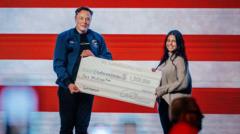Musk's controversial $1 million giveaway aims to influence voters ahead of Wisconsin's Supreme Court election, amidst legal challenges from the state's Attorney General and concerns about the electoral implications of his actions.
Elon Musk's $1 Million Giveaway Stirs Controversy Ahead of Wisconsin Supreme Court Election

Elon Musk's $1 Million Giveaway Stirs Controversy Ahead of Wisconsin Supreme Court Election
In a bold move, Elon Musk distributed $1 million cheques to Wisconsin voters, igniting legal battles and political debates just days before a pivotal Supreme Court election.
In a surprising electoral twist, billionaire entrepreneur Elon Musk has launched a controversial initiative by distributing $1 million cheques to voters in Wisconsin. This provocative move arrives just ahead of the state's high-stakes Supreme Court election, where the stakes are high enough to potentially flip the court's control to Republicans. Announced earlier this week, the giveaway has sparked a legal battle after Wisconsin Attorney General Josh Kaul filed a lawsuit against Musk, claiming that the distribution of funds violates state laws that prohibit gifts in exchange for votes.
At a recent rally, Musk ardently defended his actions, stating, “we just want judges to be judges,” as he handed out two cheques to individuals who signed a petition promoting judicial independence from "activist" judges. Kaul’s legal team contended that Musk’s giveaway constitutes an illegal attempt to buy votes, but Musk's lawyers countered, claiming that the giveaway merely aims to foster grassroots opposition to judicial activism and does not advocate for any specific candidates.
Despite the Attorney General's efforts to curtail Musk’s actions, the Wisconsin Supreme Court unanimously refused to intervene, allowing the giveaway to proceed. The election, deemed the most expensive judicial race in U.S. history with a staggering total expenditure of $81 million, could have significant implications for the state, particularly concerning issues like abortion rights, voting regulations, and congressional redistricting ahead of the approaching 2026 midterms.
Musk, a vocal supporter of the Republican candidate Judge Brad Schimel, has invested heavily in his campaign, donating an alarming $14 million. However, Schimel has distanced himself from Musk's event, claiming he is unaware of the rally's specifics, thus highlighting the complicated nature of this political alliance.
This instance follows Musk's previous controversial giveaways aimed at mobilizing voters, including a similar cash prize initiative last year. As the electoral environment heats up, observers are anxiously awaiting the court's outcome on this contentious election. The repercussions of Musk's involvement may extend far beyond the voting booths of Wisconsin, potentially influencing national debates on judicial integrity and campaign financing.



















